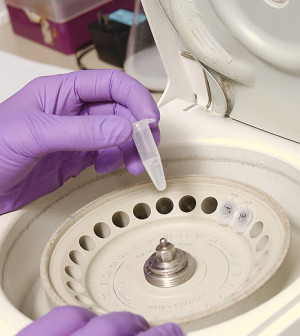- Recognizing the Signs of Hypothyroidism
- 10 Strategies to Overcome Insomnia
- Could Artificial Sweeteners Be Aging the Brain Faster?
- Techniques for Soothing Your Nervous System
- Does the Water in Your House Smell Funny? Here’s Why
- Can a Daily Dose of Apple Cider Vinegar Actually Aid Weight Loss?
- 6 Health Beverages That Can Actually Spike Your Blood Sugar
- Treatment Options for Social Anxiety Disorder
- Understanding the Connection Between Anxiety and Depression
- How Daily Prunes Can Influence Cholesterol and Inflammation
‘Designer Cells’ Show Promise Against Psoriasis in Lab Mice

Scientists say they’ve engineered cells capable of automatically detecting and treating psoriasis flare-ups in lab mice — in an early step toward a “precision” therapy for the chronic skin disease.
Experts said they were “excited” by the findings, reported Dec. 16 in the journal Science Translational Medicine. But they also cautioned that a lot of work lies ahead.
In the United States, more than 5 million people have psoriasis, according to the U.S. National Institutes of Health. The disease arises from an abnormal immune system response that triggers a rapid turnover of skin cells. As a result, people with psoriasis periodically develop thick, scaly patches on the skin that can be itchy or painful.
When psoriasis is milder, skin treatments or UV light therapy can be enough to treat the symptoms. But people with more severe psoriasis often need pills or injection drugs that suppress the immune system.
The goal of the new research was to create “designer” cells that can detect the beginnings of a psoriasis flare-up, treat it, and then “turn off” once the symptoms are contained, explained senior researcher Martin Fussenegger.
His team genetically engineered human kidney cells to spot the “signature” of specific inflammatory proteins that are released into the blood when psoriasis is flaring. The cells then churn out two other anti-inflammatory proteins that are naturally present in the body — known as IL4 and IL10.
When the researchers implanted the cells into mice with a psoriasis-like condition, they found that the therapy quashed new symptom flare-ups and also healed existing scars.
So far, the approach has only been tested in lab mice, stressed Fussenegger, a professor of biotechnology and bioengineering at ETH Zurich, in Switzerland.
“This is a proof-of-concept study,” he said.
Results of animal studies often aren’t replicated in humans. And even if the approach translates perfectly to humans, Fussenegger added, it would probably be another decade before it would be available to patients.
Dr. Doris Day, a dermatologist at Lenox Hill Hospital in New York City, agreed that many hurdles remain. But she called the science itself “incredibly creative thinking.”
“If this works out, it would be the closest thing to a cure for psoriasis I’ve ever seen,” Day said.
Others agree. “This study presents an exciting new [treatment] approach,” said Michael Siegel, director of research programs for the National Psoriasis Foundation.
“It’s encouraging to see novel science being harnessed to develop new treatments,” Siegel said. “Many psoriasis patients are not treating their disease, or not treating it to the extent that its severity warrants.”
There are newer, so-called biologic drugs that are more effective against psoriasis than older medications, Siegel said. But even better treatments are “very much in need,” he added.
Biologics — taken by injection or infusion — suppress the immune system, so they raise the risks of serious infections and certain cancers, scientists say.
Plus, Siegel said, “psoriasis is a heterogeneous disease and the same treatments don’t work for everyone, or aren’t accessible to everyone.”
For “designer cells” to become an option, however, a lot of unknowns have to be addressed.
Siegel said the cells would probably have to be taken from a patient’s own body (then genetically engineered), to limit the chances that the immune system would attack them.
“Keeping the cells alive inside the body for a long period would be a challenge,” Siegel said.
The plan, Fussenegger said, is not to infuse “naked” cells that would “float freely” in the blood.
“We’ll need to pack the cells in micro-containers, and the resulting device will be implanted in the body,” he explained. “That way, we’ll have control over the cells, and can take them out or replace them at any point.”
Even if all this pans out, there will still be practical questions about the feasibility and expense, Day said.
For now, she recommended that people with inadequately controlled psoriasis flare-ups talk to their doctor. There are new medications that are the most effective yet for treating psoriasis symptoms, Day said.
Psoriasis is more than a cosmetic concern, she added.
About 30 percent of patients develop painful joint damage and fatigue known as psoriatic arthritis, according to the National Psoriasis Foundation. Prior research has also linked to increased risks of depression and physical ills like diabetes and heart disease — possibly because of chronic inflammation in the body.
More information
The National Psoriasis Foundation has more on psoriasis.
Source: HealthDay
Copyright © 2026 HealthDay. All rights reserved.










